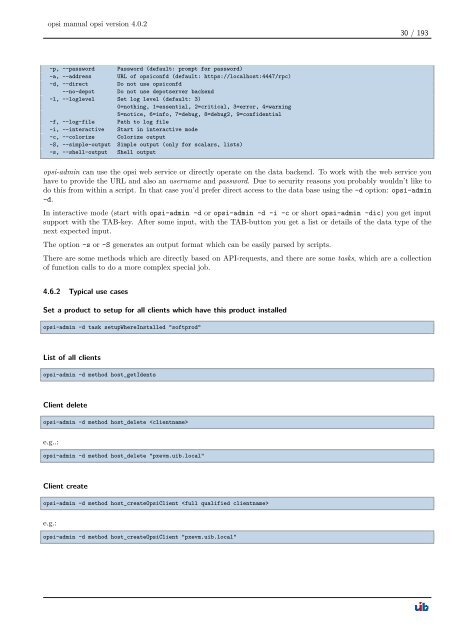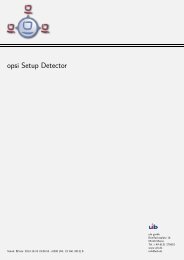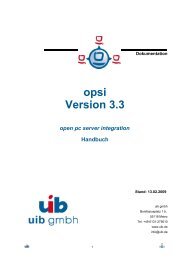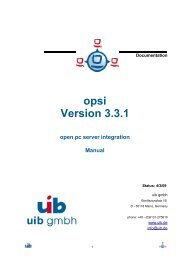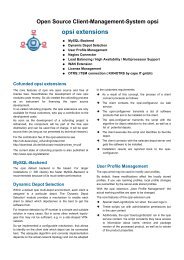opsi manual opsi version 4.0.2 - opsi Download - uib
opsi manual opsi version 4.0.2 - opsi Download - uib
opsi manual opsi version 4.0.2 - opsi Download - uib
Create successful ePaper yourself
Turn your PDF publications into a flip-book with our unique Google optimized e-Paper software.
<strong>opsi</strong> <strong>manual</strong> <strong>opsi</strong> <strong>version</strong> <strong>4.0.2</strong><br />
-p, --password Password (default: prompt for password)<br />
-a, --address URL of <strong>opsi</strong>confd (default: https://localhost:4447/rpc)<br />
-d, --direct Do not use <strong>opsi</strong>confd<br />
--no-depot Do not use depotserver backend<br />
-l, --loglevel Set log level (default: 3)<br />
0=nothing, 1=essential, 2=critical, 3=error, 4=warning<br />
5=notice, 6=info, 7=debug, 8=debug2, 9=confidential<br />
-f, --log-file Path to log file<br />
-i, --interactive Start in interactive mode<br />
-c, --colorize Colorize output<br />
-S, --simple-output Simple output (only for scalars, lists)<br />
-s, --shell-output Shell output<br />
30 / 193<br />
<strong>opsi</strong>-admin can use the <strong>opsi</strong> web service or directly operate on the data backend. To work with the web service you<br />
have to provide the URL and also an username and password. Due to security reasons you probably wouldn’t like to<br />
do this from within a script. In that case you’d prefer direct access to the data base using the -d option: <strong>opsi</strong>-admin<br />
-d.<br />
In interactive mode (start with <strong>opsi</strong>-admin -d or <strong>opsi</strong>-admin -d -i -c or short <strong>opsi</strong>-admin -dic) you get input<br />
support with the TAB-key. After some input, with the TAB-button you get a list or details of the data type of the<br />
next expected input.<br />
The option -s or -S generates an output format which can be easily parsed by scripts.<br />
There are some methods which are directly based on API-requests, and there are some tasks, which are a collection<br />
of function calls to do a more complex special job.<br />
4.6.2 Typical use cases<br />
Set a product to setup for all clients which have this product installed<br />
<strong>opsi</strong>-admin -d task setupWhereInstalled "softprod"<br />
List of all clients<br />
<strong>opsi</strong>-admin -d method host_getIdents<br />
Client delete<br />
<strong>opsi</strong>-admin -d method host_delete <br />
e.g..:<br />
<strong>opsi</strong>-admin -d method host_delete "pxevm.<strong>uib</strong>.local"<br />
Client create<br />
<strong>opsi</strong>-admin -d method host_createOpsiClient <br />
e.g.:<br />
<strong>opsi</strong>-admin -d method host_createOpsiClient "pxevm.<strong>uib</strong>.local"


